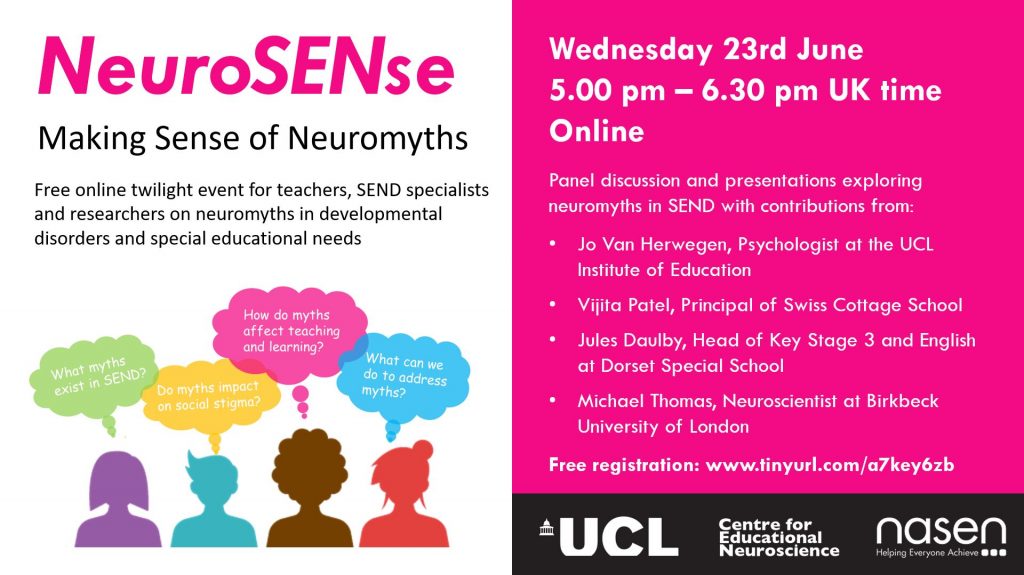Free online twilight event for teachers, SENCOs, SEND specialists, and researchers on neuromyths in developmental disorders and special educational needs.
Wednesday 23rd June from 5.00 pm – 6.30 pm (UK Time)
Registration: here
Neuromyths are commonly held misconceptions about the brain and learning believed by both the general public and educators. A great deal of work has been undertaken to dispel common neuromyths such as “you only use 10% of your brain” or “children learn best in their preferred learning style”. However, recent research is beginning to uncover previously hidden neuromyths related to neurodevelopmental disorders and special educational needs. The NeuroSENse twilight event aims to build an understanding of these neuromyths through dialogue between teachers and researchers.
The twilight session will include presentations from psychologists and neuroscientists on neuromyths in special educational needs, a panel discussion between researchers and teachers and an audience Q&A session. Throughout the event, we will explore questions relating to the prevalence of neuromyths in special educational needs, how they might affect teaching and learning, their impact on social stigma, and what steps can be taken to start addressing any misconceptions.
The twilight event is free and open to all teachers, SEND specialists and researchers. To attend, please register here
Program
17.00-17.05
Introduction
17.05-17.20
Presentation on educational neuroscience and developmental disorders from Michael Thomas, Cognitive Neuroscientist at Birkbeck University of London and the Director of the University of London’s Centre for Educational Neuroscience.
17.20-17.40
Presentation on neuromyths related to SEND research from Jo Van Herwegen, Developmental Psychologist at the UCL Institute of Education and Director of the Child Development and Learning Difficulties Lab.
17.40-18.10
Panel discussion exploring the prevalence of neuromyths in SEND, their impact on teaching, learning, and social stigma, and ways forward to address misconceptions.
Discussant:
- Amelia Roberts, Deputy Director of the UCL Centre for Inclusive Education.
Panel:
- Vijita Patel, Principal of Swiss Cottage School, Development and Research Centre, a special needs school for children aged 2 to 19.
- Jules Daulby, Head of Key Stage 3 and English at Dorset Special School.
- Jo Van Herwegen, Developmental Psychologist at the UCL Institute of Education and Director of the Child Development and Learning Difficulties Lab.
- Michael Thomas, Cognitive Neuroscientist at Birkbeck University of London and Director of the University of London’s Centre for Educational Neuroscience.
18.10-18.25
Q&A with audience
18.25-18.30
Closing remarks

